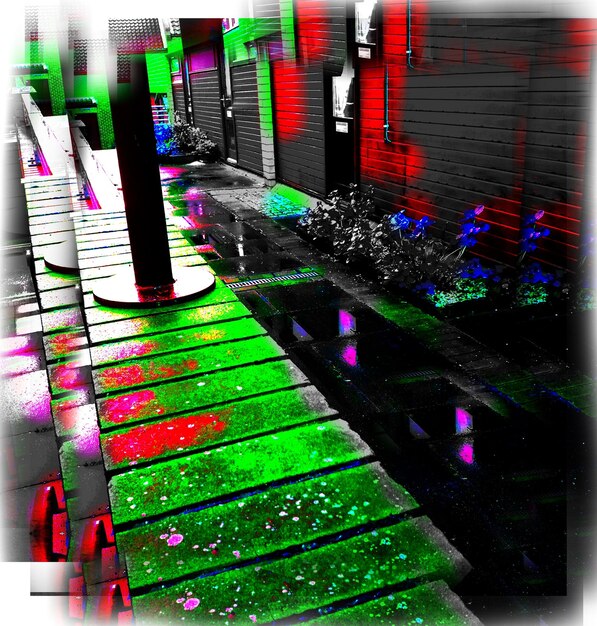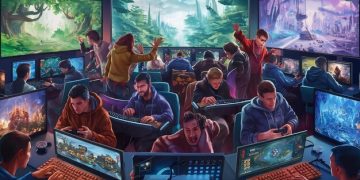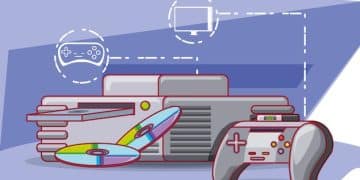Unleashing Creativity: Console Modding and Homebrew on PlayStation and Xbox

Console modding and homebrew encompass the customization of PlayStation and Xbox consoles, enabling users to run unofficial software, enhance performance, and explore functionalities beyond the original manufacturer’s specifications.
Ready to unlock hidden potential? The console modding scene: exploring customization and homebrew on PlayStation and Xbox is a vibrant community dedicated to pushing the limits of these gaming machines, from cosmetic changes to running entirely custom software.
What is Console Modding?
Console modding involves altering the hardware or software of a gaming console. This can range from simple cosmetic changes to complex modifications that allow for the execution of homebrew software or the improvement of system performance. It’s a way for enthusiasts to take control of their gaming experience.
The modding scene has evolved significantly over the years, from early chip installations to more sophisticated software hacks. However, the core principle remains the same: to unlock the full potential of the console beyond its intended use.

Types of Console Mods
The world of console modding offers a wide range of possibilities, catering to different tastes and skill levels. Here are some popular mod types:
- Cosmetic Mods: Include painting the console, adding LED lights, or replacing buttons and shells. These mods are purely for aesthetics and don’t affect the console’s performance.
- Performance Mods: Focus on improving the console’s performance, such as adding better cooling systems or overclocking the CPU and GPU.
- Software Mods: Involve modifying the console’s software to run homebrew applications, emulators, or custom firmware. This is often achieved through exploits or custom software.
- Modchips: Physical chips installed inside the console to bypass security measures and allow for the execution of unsigned code.
Console modding gives the user near limitless possibilities to personalize their device.
The Homebrew Scene
Homebrew refers to software created by hobbyist programmers and developers for closed platforms like gaming consoles. These applications can range from simple utilities to full-fledged games and emulators. The homebrew scene thrives on community collaboration and sharing.
For many console modders, the ability to run homebrew is the primary motivation for their modifications. It opens up a world of possibilities beyond the official software ecosystem, allowing users to explore new games, applications, and features.
Benefits of Homebrew
- Access to Unique Games: Homebrew developers often create games that explore niche genres or experimental gameplay mechanics.
- Emulation of Classic Consoles: Run emulators for older consoles and play classic games on your modded system.
- Customization Options: Homebrew applications can provide advanced customization options for the console’s interface and settings.
The ability to play unique custom made games is what draws people to the homebrew scene.
Modding and Homebrew on PlayStation
PlayStation consoles have a rich history of modding and homebrew, with various communities dedicated to exploring the capabilities of each generation. From the original PlayStation to the PS5, modders have consistently found ways to unlock hidden potential.
The PlayStation modding scene is well-established and has led to many homebrew innovations. The PS2 being a particularly popular platform for homebrew development due to its widespread adoption and relatively open architecture.
Popular PlayStation Mods
- PS1 Modchips: Early modchips allowed users to play imported games and burned copies.
- PS2 Homebrew Enablers: Software exploits and tools enabled the running of homebrew applications and emulators.
- PSP Custom Firmware: Custom firmware unlocked a wide range of features and customizations on the PSP.
The PSP’s custom firmware was extremely popular due to its wide range of uses.

Modding and Homebrew on Xbox
Xbox consoles have also been subject to extensive modding and homebrew efforts. The original Xbox, in particular, was a favorite among modders due to its PC-like architecture and relatively easy-to-exploit software.
Xbox modding has brought a plethora of homebrew applications to the platform, allowing users to extend functionality. The original Xbox was the major focus during its prime.
Popular Xbox Mods
- Xbox Modchips: Modchips bypassed security measures and allowed for the execution of unsigned code and custom dashboards.
- Xbox Media Center (XBMC): A popular homebrew media player that transformed the Xbox into a versatile entertainment center.
- Custom Dashboards: Alternative dashboards provided enhanced customization options and access to homebrew applications.
The addition of modchips to the original Xbox allowed users to get more out of their systems.
Risks and Considerations
While the console modding scene offers many exciting possibilities, it’s essential to be aware of the risks involved. Modding can void your console’s warranty, potentially damage the hardware, and even lead to legal issues if you’re distributing copyrighted material.
Before diving into the world of console modding, research the specific modifications you’re interested in and understand the potential consequences. It’s also crucial to respect copyright laws and avoid distributing copyrighted material.
Potential Risks of Modding
- Warranty Voidance: Modifying your console typically voids the manufacturer’s warranty.
- Hardware Damage: Incorrect modding can damage the console’s hardware, potentially rendering it unusable.
- Legal Issues: Distributing copyrighted material or using mods for piracy can lead to legal repercussions.
Take these risks into account before starting the modding process.
The Future of Console Modding
As consoles become increasingly complex and locked down, the modding scene faces new challenges. However, dedicated modders and homebrew developers continue to find ways to circumvent security measures and unlock the hidden potential of these gaming machines.
The future of console modding will likely involve a combination of hardware and software exploits. With the rise of cloud gaming and digital distribution, the modding community needs to be more resourceful to keep up.
The modding community will continue to strive forward as gaming technologies evolve.
| Key Point | Brief Description |
|---|---|
| 🛠️ What is Modding? | Altering console hardware or software for enhanced functions. |
| 🎮 Homebrew Benefits | Access to unique games and emulation of classic consoles. |
| ⚠️ Modding Risks | Warranty voidance and potential hardware damage. |
| 💡 Future of Modding | Adapting to complex consoles with resourceful hardware/software exploits. |
FAQ
▼
A modchip is a small electronic device installed in a console to bypass security measures, allowing unsigned code to run. This enables playing imported games, running homebrew, and more.
▼
Modding itself is generally legal, but distributing copyrighted material or using mods for piracy is illegal. It’s important to respect copyright laws when engaging in console modding activities.
▼
Yes, modifying your console typically voids the manufacturer’s warranty. If you’re concerned about your warranty, it’s best to avoid modding your console until it expires.
▼
Homebrew refers to software created by amateur developers and enthusiasts typically for closed platforms like gaming consoles. This includes everything from utilities to games to emulators of other systems.
▼
The difficulty of modding varies depending on the specific modification and the console involved. Some mods are relatively simple and can be performed by beginners, while others require advanced technical skills and specialized tools.
Conclusion
The console modding scene: exploring customization and homebrew on PlayStation and Xbox is a testament to the ingenuity and passion of gamers. While it comes with inherent risks, the potential for unlocking new experiences and customizing your console remains a powerful draw for enthusiasts. As the gaming world evolves, the modding community will undoubtedly continue pushing boundaries and exploring the limitless possibilities of console customization.





